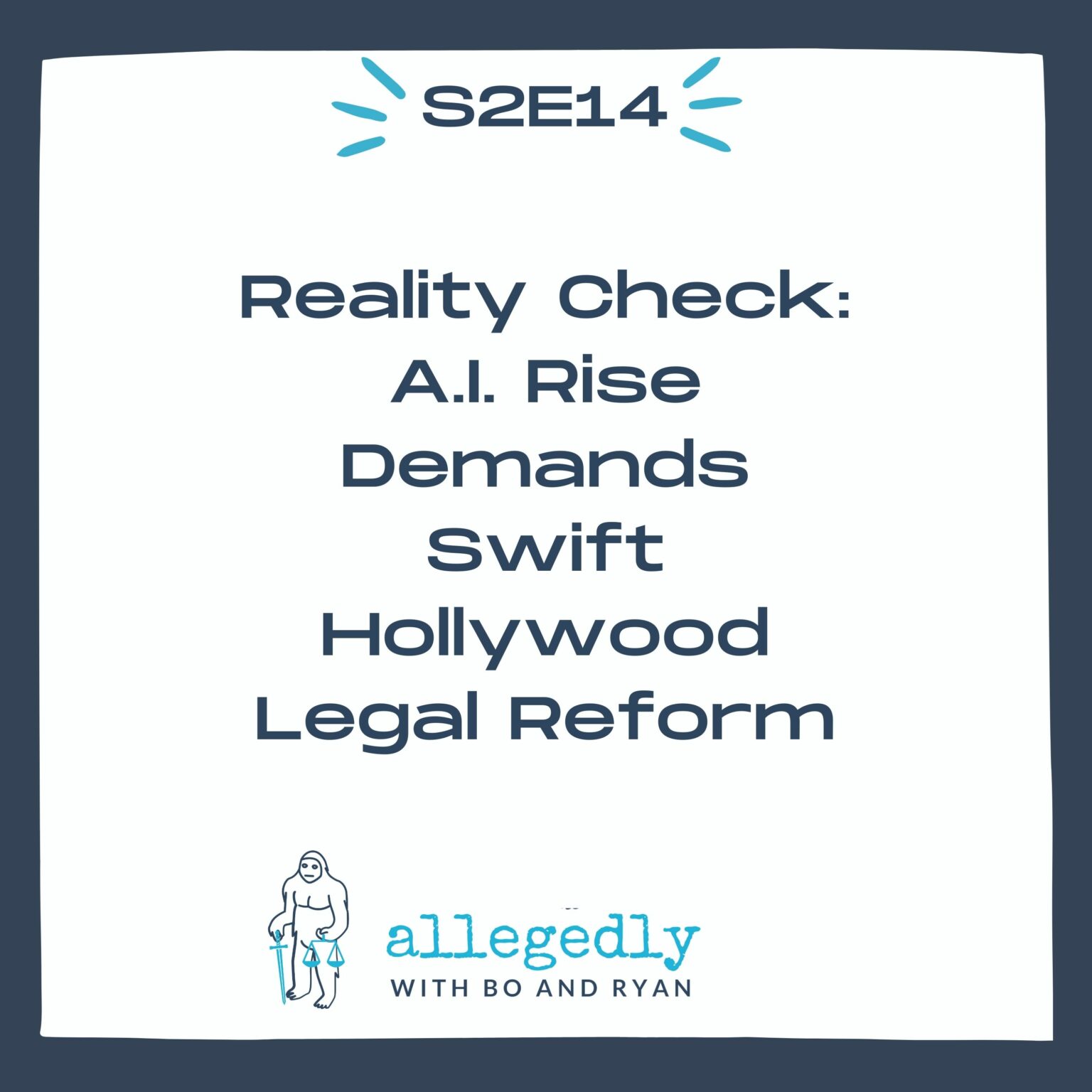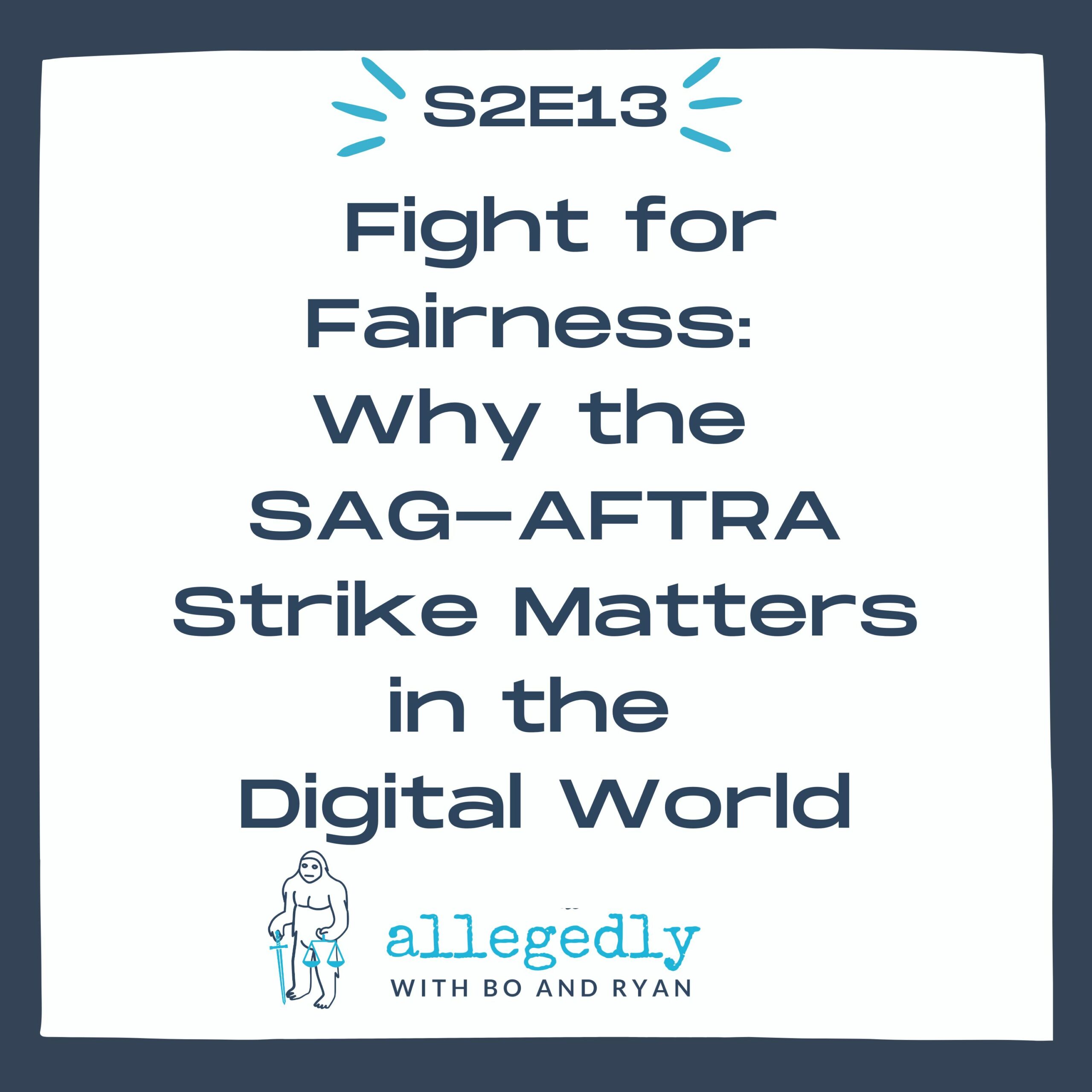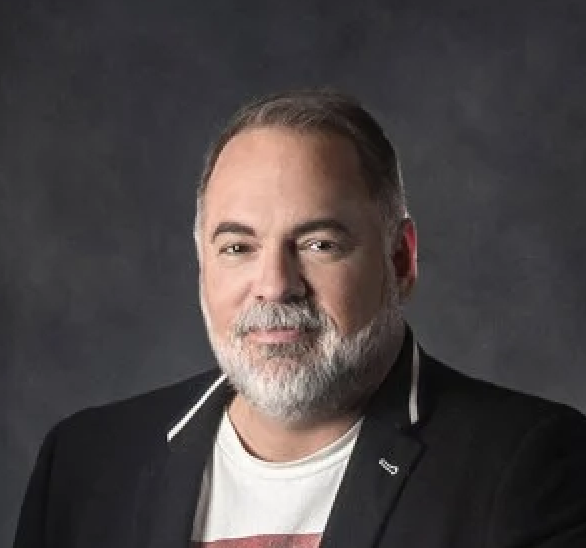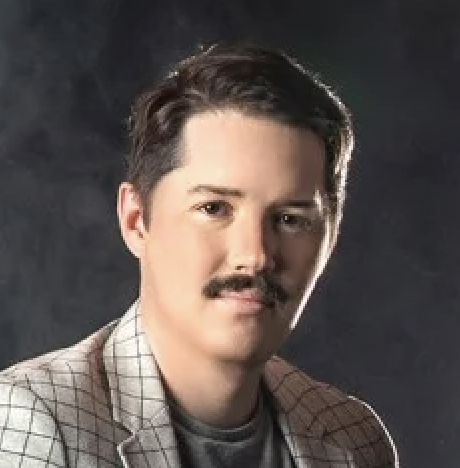allegedly with Bo and Ryan | Season 2 Episode 4
Allegedly… with Bo and Ryan Podcast S2E4| Transcript
Bo: [00:00:00] If zombies legally aren’t considered human, you’re probably fine going on a zombie slaughter. But if the court rules that they are still technically legally considered humans, you know, you start sniping them from a rooftop, you may find yourself in jail.
Ryan: [00:00:18] Welcome to Allegedly with Bo and Ryan, the only entertainment and law podcast that brings you the truth, the whole truth and nothing but the truth… Allegedly.
Bo: [00:00:28] I’m Bo Bowen.
Ryan: [00:00:29] And I’m Ryan Schmidt.
Bo: [00:00:31] And you’re listening to Allegedly with Bo and Ryan. We’re coming to you from our law offices in beautiful historic Savannah, Georgia, where we’ll be chatting about pop culture, hot legal topics in the news, and doing our best to change the way people think about the law and lawyers. But first, a little about us. Ryan is well renowned as a world traveler. In fact, when in Rome, they do as Ryan does.
Ryan: [00:00:57] And Bo’s legal services are in such demand that his business card simply says, I’ll call you. Together, we are Savannah’s consummate renegade legal titans.
Bo: [00:01:08] And the only corporate entertainment lawyers in the free world who have never lost a single case.
Ryan: [00:01:13] Allegedly.
Bo: [00:01:14] Well, welcome to another action packed episode of Allegedly with Bo and Ryan. I’m glad you were able to join us today, Ryan, because I know you’re about to head off on one of your famous world travels.
Ryan: [00:01:28] That’s right. Yeah. We’re about to head off to Amsterdam to see my brother-in-law row in the Heineken Regatta. And I’m sure we will have absolutely zero fun doing that.
Bo: [00:01:40] Absolutely.
Ryan: [00:01:41] You’ve been to Amsterdam, right?
Bo: [00:01:42] Oh, yeah. Well, it was amazing. Such fun. In fact, I was actually in Amsterdam on September 11th, 2001.
Ryan: [00:01:51] That must have been a wild time.
Bo: [00:01:52] That was crazy. Of course, all air travel shut down. So we were there several extra days, but not a bad place to be stranded.
Ryan: [00:02:00] No, of course not. Well, what are some other places that you’ve liked to have traveled?
Bo: [00:02:04] Well, I mean, I always loved traveling with my family. Anywhere we’re able to take the kids, it’s always, you know, so much fun to to travel with your kids. You know, we love going to New York and seeing Broadway plays, heading out to L.A., anywhere in the Caribbean. But personally, I think one of my favorite spots on the globe is this thing in Jamaica called the Luminous Lagoon.
Ryan: [00:02:31] The Luminous Lagoon.
Bo: [00:02:33] So it’s one of those, one of the just handful of places in the world that has the bioluminescent plankton.
Ryan: [00:02:40] Yes.
Bo: [00:02:40] So they’ll take you out there at night, and you can dive in the water. And the water just looks normal until you put your hand in it, and then it starts glowing with the light of a thousand stars. You know, it’s just so magical. And you can really stay in the water for as long as you want. And it really is a once in a lifetime type experience. That’s got to be magical.
Ryan: [00:03:02] I’ve seen videos of that and it looks like Avatar, but in real life.
Bo: [00:03:07] It really does. It was so cool. And the wild thing about it is even when you get back to your hotel room, you take off your your swimsuit and kind of wring it out, it starts glowing. Oh, it’s so wild.
Ryan: [00:03:23] Well, actually, I remember a couple of years back, I got a like a Christmas gift where they they sold this little, like, dinosaur shaped like device. It was like a fish tank, really, that was filled with those bioluminescent plankton. And so at night, you could kind of like shake it up a little bit and see it glow. Not as cool as what you did.
Bo: [00:03:43] I highly recommend it. If you’re ever going to go to Jamaica, definitely check out The Luminous Lagoon. You won’t regret it. So how about you, Ryan? I know you travel a lot more than I do. So what are some of your favorite places?
Ryan: [00:03:56] Well, we love the Caribbean. That’s like the British Virgin Islands. Probably one of our favorite places in the world. And that’s where we spent our honeymoon, my wife and I, we went to Virgin Gorda, which I think you’ve visited It was just one of the coolest places in the world, with the nicest people. No concept of crime or anything like that. I remember we picked up our rental car and they said, you know, once go through customs, it’s just going to be a car in the parking lot. You know, it’s unlocked and the keys are right on the front seat. I’m like, This would never happen anywhere else. It it was just it was just wonderful.
Bo: [00:04:36] Yeah. Well, one thing I loved about the British Virgin Islands is, you know, compared to the US Virgin Islands, they’re basically deserted. I mean, you could walk down and have entire beautiful Caribbean beaches basically to yourself.
Ryan: [00:04:48] Oh, absolutely.
Bo: [00:04:49] Amazing.
Ryan: [00:04:50] That was that was us. For a whole week, the first week of our honeymoon, we were just at this one beach that was huge. Like as the whole as far as you could see. We had it completely to ourselves. And also you get the sense because it’s such a remote place and there isn’t a whole lot of people, that you can kind of just do whatever you want to do and nobody’s going to stop you. Like I remember swimming in the ocean. I was like: ‘I can probably swim out to that island.’ And I kept looking back for somebody to tell me, ‘Hey, I think you’ve gone too far.’ And it didn’t happen. I definitely gassed out and was like, ‘Yeah, I’m not going to make it to that.’
Bo: [00:05:25] Well, and the other amazing thing about the Caribbean conch fritters.
Ryan: [00:05:31] Oh my God, this is one of the one of the most amazing things ever. But I remember when we were there, we rented that car that I was telling you about that they left the door open. It was a car called the Suzuki Jimny, which is like the Japanese only version of the Suzuki Samurai that was available in America in the 80s and the 90s. You remember that car?
Bo: [00:05:53] Sure.
Ryan: [00:05:54] So this thing is so cute and little. And it looks like a jeep that’s been like just shrunken in the dryer. It’s just so awesome. And we had such a blast just putting around this little island in it that when I got home to America, I was like, ‘I need to buy this car. I just need to relive that.’ And I was bummed to find out that thanks to some pesky US safety regulations, they weren’t allowed in America. But what I did find out is the 25 year rule. Do you know about this import 25 year rule?
Bo: [00:06:28] No.
Ryan: [00:06:28] After 25 years, any car that failed to meet US safety regulations can be imported into America. So if you ever see any old cars with like that you’ve never seen before that were Japanese, that were British or something, you see a steering wheel on the wrong side of the road, good chances they’re over 25 years old.
Bo: [00:06:48] So. So let me make sure I understand the logic here. The logic is if it’s not safe to drive on American roads, we wait until it gets really old and broken down, and then it’ll be fine.
Ryan: [00:07:01] Exactly. And it’s a classic now.
Bo: [00:07:04] Oh, my gosh. No. Was not familiar with that little tidbit of the law.
Ryan: [00:07:10] But that reminds me, I mean, you’ve got a pretty good international car rental story yourself.
Bo: [00:07:16] Well, I mean, that depends entirely upon your definition of the word “good,” Ryan.
Ryan: [00:07:22] Okay, well what happened?
Bo: [00:07:23] Well, this was several years ago. I went to the Cannes Film Festival, obviously in Cannes, France, and rented the official vehicle of the film festival, which was a Renault. It was some sedan. I don’t remember the name of it. Beautiful vehicle, you know, traveling around in style. Around Cannes, they have a lot of these old walled cities with very narrow roads and tunnels. It was beautiful, beautiful. One of the most beautiful places in the world. So I’m not going to say the name to protect the guilty, but I was with a friend of mine, a very good friend of mine, and she had grown up going to France with her family as a child. And she assured me as we pulled into one of these old historic cities, you will definitely, you absolutely can make it through this tunnel with this beautiful rental sedan. And I’m like, this thing looks very narrow. She said, ‘Listen, you’ve got a mile on either side. You’re fine.’ So I said, ‘Well, okay.’ And so I start to go through and that’s when I hear the worst noise in the history of the world. Not from one side of the car, but both.
Ryan: [00:08:46] Oh, no.
Bo: [00:08:51] As we’re scraping these stone walls on either side. And I’m like, Oh, no. Like, well, you got no choice now. Now you got to reverse and go back and try to get back out, which made the noise ten times worse. And I’m thinking, okay, we finally get out. I’m thinking maybe it won’t be so bad. It was.
Ryan: [00:09:17] Oh, my God.
Bo: [00:09:18] And then it turned out when I was limping it back to the to the airport, you know, you know, trying to think how how am I going to explain the fact I just destroyed this beautiful vehicle?
Ryan: [00:09:32] Maybe they won’t notice.
Bo: [00:09:33] Yeah, well, it was already like that when you gave it to me, so I knew I had to fill it up with gas. Literally, the only time I stopped for gas the entire time I was there.
Ryan: [00:09:44] You mean petrol?
Bo: [00:09:45] Petrol. Yeah. Well, I knew it was a diesel vehicle. Okay.
Ryan: [00:09:50] Yeah.
Bo: [00:09:51] But I didn’t think about the fact that the gas pumps were going to be labeled in French.
Ryan: [00:10:00] And you don’t speak French.
Bo: [00:10:00] I do not, and I had no idea what the French word was for gas, what the French word was for diesel. So I’m like, okay, I’ll just guess. Well, guessed wrong. Filled up this diesel engine with regular gasoline and immediately started to pull away from the gas station. It cranks, starts knocking, starts smoking. Luckily, I’m only about 50 yards away from the rental place at this point. And I’m like, I get there and there’s a sign up that just says “park, leave the keys in the slot,” you know, and be on your way. And I’m like, the perfect crime.
Ryan: [00:10:43] By the time they figure this out, I’ll be on a plane.
Bo: [00:10:45] I’ll be in America, and they’ll have no idea. And I’m like, I’m so relieved until I get my next credit card statement where it turns out I bought a Renault in France.
Ryan: [00:11:00] I actually just thought about that story when we were renting a car because there’s such crazy mandatory insurance policies that you have to get to rent a car in Europe. Where you’re basically buying the car if anything happens.
Bo: [00:11:16] Yep, and I did. So, fun times. Well, speaking of, you know, horrible things, that brings us to today’s topic, Ryan. I have a very serious, very timely topic that I want to discuss with you today, talking about, of course, zombies.
Ryan: [00:11:37] Yes.
Bo: [00:11:38] Now, we’re obviously both huge fans of the “Last of Us” on HBO. Of course, we currently right now, we’ve got Fear The Walking Dead filming here in Savannah. It got me thinking, okay, if a zombie apocalypse really occurred, would zombies have any legal rights?
Ryan: [00:12:01] Interesting. Well, that raises some really complicated legal issues, I would think. I mean, after all, zombies were once human. They at one point had full legal rights. And in many of these apocalypse shows, governments and societies as we know it have been completely collapsed. In the Walking Dead, there isn’t a centralized government, as far as I know. And in the last of us, we have FEDRA, some type of federal police which at least indicates that there’s some federal government doing something somewhere.
Bo: [00:12:32] Right. It almost seems like FEMA maybe became like militarized, something like that. Exactly.
Ryan: [00:12:40] So my my guess is that there’s still some federal government in that universe and they’ve probably declared a national emergency against these mushroom zombies– fair enough–and have given themselves the full scope of their executive and legislative powers. Martial law has actually been invoked throughout our country’s history following Pearl Harbor and Hurricane Katrina. Basic rights and liberties are often suspended until an emergency dies down and everything is safe to resume as normal. But as you know, that doesn’t really happen in a zombie show.
Bo: [00:13:13] No, not many of them go back to norma.
Ryan: [00:13:16] Things just don’t go back to normal. And that’s why you see so many people administering their own form of justice in these shows. But for argument’s sake, let’s just say that the court systems are still open, there hasn’t been martial law, and the whole world doesn’t just completely collapse. You know, I guess the primary question from a legal standpoint would be whether the Supreme Court would ultimately rule that zombies are considered humans.
Bo: [00:13:42] Well, I think the answer to that question is obvious. The answer that would probably hinge entirely on would that current Supreme Court believe zombies are more likely to vote Democrat or Republican?
Ryan: [00:13:55] Ouch.
Bo: [00:13:56] But you’re exactly right. I mean, if zombies legally aren’t considered human, you’re probably fine going on a zombie slaughter, you know, like Woody Harrelson in Zombieland. But if the court rules that they are still technically legally considered humans, you can probably still kill them, but it would only be able to be in self-defense or defending others. I mean, you know, you start sniping them from a rooftop, you may find yourself in jail.
Ryan: [00:14:26] What about the legal responsibility from the zombies perspective? Are they legally responsible for the people they kill?
Bo: [00:14:34] Well, you know, that’s an interesting perspective, Ryan. Now, if I were defending a zombie–and I can neither confirm nor deny that I have actually done that in the past–I personally would argue that zombies lack conscious thought, so they can’t be held responsible for their actions. It essentially would be a temporary insanity type defense. Whether they’re killing people, whether they’re being charged with property damage because they’re making one of those huge zombie like swarms from World War Z and like knocking down walls, that kind of thing. Even if they were cured later, I would argue they couldn’t be responsible criminally for those actions because it happened during a time they couldn’t consciously tell right from wrong. Same exact defense you make in a in a temporary insanity defense.
Ryan: [00:15:40] Now, that’s interesting. I mean, that makes me also think about that movie “28 Days Later,” right, where things were really bad and then like, ‘oh, like we’re getting better. The virus is dying off.’ And I guess I guess there is some some times where things do get better, right?
Bo: [00:15:55] Yeah. I mean, 28 days later, like, wasn’t there a sequel where it got really bad again?
Ryan: [00:16:03] Well. I guess you expose that I haven’t watched the sequel. Just ended kind of, hopefully, but I’ll go and see that. Guess it really comes down to one question though. Are zombies alive but infected or are they actually just reanimated corpse that would be considered legally dead? And in that case, I think they’d lose all their rights under the American justice system.
Bo: [00:16:28] Well, yeah, that’s that’s you’re right. That’s a very good point. You know, I think like in “Walking Dead,” they really make it clear that someone has to literally die before their corpse, then gets reanimated by whatever, this they never really explain it. Um, and so they are technically legally dead before that, that corpse comes back to life–for lack of a better word–but with no conscious thought. Like I said. But I don’t know that that’s necessarily the case. In “The Last of Us”, though, I’m thinking back to like the first episode where there’s the old lady in the wheelchair. She seems to still be sitting there alive. Okay, but but she’s kind of starting to twitch and snarl as the cordyceps is starting to take over her brain. So I think maybe in “Last of Us,” they’re still technically alive, but infected. What do you think?
Ryan: [00:17:28] Yeah, I think you’re right. I think that there, the cordyceps are really just hijacking their brain, but they’re still alive. And even in that show you see dead infected that just haven’t survived that transition. Right. But the people that are still among them, the clickers and the infected and then that giant Bloater guy, those are all people that have been infected for so long that they’ve kind of merged into that that new form.
Bo: [00:18:01] Yeah, being alive but infected really would, in real life, raise some really thorny legal issues.
Ryan: [00:18:11] Man I would like to cross examine a clicker. That’d be. That’d be pretty good. Right?
Bo: [00:18:16] And the big bloated one that you’re saying that that was actually a zombie? I thought that was Newt Gingrich.
Ryan: [00:18:22] Oh. Brutal. I actually watched the guy who, like, played that zombie. And he’s been he’s been in Game of Thrones. He’s been a bunch of stuff. He’s actually. Have you seen any articles about this guy?
Bo: [00:18:36] No.
Ryan: [00:18:37] He’s like six foot seven, 250 pounds, pure muscle, just like an eight pack. Right. And he had to wear like over 100 pounds of makeup to make that whole thing happen. It was ridiculous.
Bo: [00:18:51] Wow, That’s amazing.
Ryan: [00:18:53] But I mean, he does kind of look like Newt Gingrich.
Bo: [00:18:57] So, you know, I feel like that the whole analysis of dead versus alive, I mean, there’s got to be other movies. There’s so many supernatural movies out there. I mean, what’s another movie that that might apply to?
Ryan: [00:19:15] I mean, I kind of think about Ghostbusters, right?
Bo: [00:19:21] Yeah. I mean, that’s a good point because like reanimated corpse zombies, like in “Walking Dead,” Ghosts were definitely once people, but they would have to be considered dead from a legal perspective.
Ryan: [00:19:39] Yeah, I feel like if my grandmother became a ghost and she was being held prisoner in a machine in the basement of a building in New York, I would have a problem with that.
Bo: [00:19:48] Well, all right. I get where you’re coming from with that. That is a valid point. But it’s hard to imagine, you know, under the current law, even this current Supreme Court, ruling that ghosts have any rights as people under the law. But, you know, if anyone could do it, Ryan. My money’s on you. I mean, I could see it now. Ryan Schmidt, ghost lawyer. Um, could someone get Steven Spielberg on the phone for me, please?
Ryan: [00:20:17] Guilty as charged. I mean, you know me. Well, when in doubt, I always try to look at the Black’s law dictionary, and it defines a person as a human being. And I think that in any set of circumstances, a ghost is not going to be considered a human being.
Bo: [00:20:34] You’re right. But I still don’t think that means the Ghostbusters get away scot free, though. I mean, they have done an awful lot of property damage from crossing the streams.
Ryan: [00:20:46] Well, let’s take this analysis a little bit further. I’m loving geeking out with you right now. So what about people that are definitely still human beings but have superpowers or mutant powers like the X-Men? Do you think these mutants would be protected under the due process clause of the 14th Amendment?
Bo: [00:21:06] Honestly, I don’t even think you got to go to the due process clause. I think it’s even simpler than that. I feel like mutants would probably be entitled to protection under the Americans with Disabilities Act. I mean, at least the mutants who can control their powers. Okay. I mean, if, you know, if Hulk gets pissed off and starts uncontrollably smashing the shit out of things, you know, he’s probably still going to jail.
Ryan: [00:21:31] That would be an interesting world, though, where mutants have rights under the ADA. But I think you’re right. I mean, under the ADA, every mutant could control their powers would definitely be protected from discrimination involving at least employment issues in any provision of public accommodations.
Bo: [00:21:50] So yeah, and you know, all that, you know, they make a big deal about discrimination. Actually, in the X-Men movies, they have the anti-mutant legislation that gets proposed and also in the comics. And, you know, that type of legislation would almost certainly get successfully challenged under the Due Process clause of the Constitution. I mean, you can’t discriminate against somebody just because they happen to be born with a superpower. That’s not their fault. It’s not a conscious decision, something they’ve done. Now, they would still be responsible for how they use their powers, though, especially if they posed a danger to others. But otherwise they’re fully protected.
Ryan: [00:22:34] Okay. Well, that made me think I’ve got a hot take for you. Well, of course, discrimination works both ways, right? Sure. So mutants can actually engage in discrimination as well. And no one does it more egregiously than Professor X himself, Charles Xavier. You know how Professor Xavier runs a school for mutants?
Bo: [00:22:54] Sure.
Ryan: [00:22:54] Well, if you watch closely, you’ll notice that he only employs mutants at his school.
Bo: [00:23:00] That’s true.
Ryan: [00:23:01] There’s actually a federal law called the Genetic Information Nondiscrimination Act, and it prohibits any employer from using genetic information in hiring, firing, or any other employment related decision, with absolutely no exceptions.
Bo: [00:23:15] Huh.
Ryan: [00:23:15] So just because the movies are designed to make you feel bad for the fact that mutants are discriminated against, that doesn’t mean that they get to turn around and discriminate others.
Bo: [00:23:24] Wow. Yeah. Discriminating against non-mutants a bunch of assholes.
Ryan: [00:23:29] I would take a job as a janitor at their school. I mean, hell, pretty cool. Well, all right.
Bo: [00:23:36] Ryan, I got another one for you? All right, So. So I think that covers zombies, ghosts, mutants. But how about elves? And in particular, one specific elf. And I’m talking about that jolly old elf named Saint Nicholas, the one and only Santa Claus. Now, I know we recently did a couple of podcasts where we went through all the crimes committed in Christmas movies, but we kind of gave Santa himself a pass.
Ryan: [00:24:11] Yeah, no, we did. Now, that brings up a good point. Is Santa an elf?
Bo: [00:24:16] Well, I feel like in the “Night Before Christmas,” I think they refer to him as that jolly old elf.
Ryan: [00:24:24] Yeah, and like the head elf usually. Okay, I’ll take it. I’ll do it. I’ll bite. Well, I think you’re right. I have to say, even as a kid, I was kind of creeped out by the fact that Santa was watching you 24/7 to see if you were naughty or nice, even when you were sleeping, like, Dude, stop checking in on me. But what about the fact that he literally engages in breaking and entering into every home on Earth?
Bo: [00:24:48] Exactly. I mean, it’s kind of messed up, right? I mean, legally, though, I think it’s all going to come down to consent. In other words, if you leave out milk and cookies, that’s essentially an implied contract for old Saint Nick, telling him he’s welcome to enter your home and judge you for being naughty or nice and hopefully leave you a present. So if you want to receive presents from Santa, then you are agreeing to give up your right to privacy. And if you stop believing in Santa and you don’t leave out any milk or cookies. Pretty good chance Santa is not coming down your chimney.
Ryan: [00:25:33] Well, all that might be right, but it’s interesting that this contract only seems to apply to Santa Claus.
Bo: [00:25:38] What do you mean?
Ryan: [00:25:40] I mean, we’ve talked about if somebody else breaks into your house even as just to give presents, they are still breaking and entering and trespassing. We’ve talked about Jack Skellington Skellington. We’ve talked about the Grinch, you know, and that’s why Jack Skellington got in so much trouble in the “Nightmare Before Christmas.” Just because he has good intentions and wanted to act like Santa, doesn’t mean that he didn’t do any of those things with that implied contract. And it was particularly at fault for impersonating Santa as trademarks, looks, attitude, personality, all without permission.
Bo: [00:26:11] Yeah, well, that and kidnapping Santa from the North Pole. You know, that was an issue too.
Bo: [00:26:21] Talking about like the Hulk being arrested for smashing makes me think of another superhero related legal question right now. You know, one of my favorite Marvel characters is definitely Iron Man.
Ryan: [00:26:37] Yep.
Bo: [00:26:37] Now, well, technically, Tony Stark. I like Tony Stark, Iron Man himself is little dull, but. But one of the things I like about Tony Stark, both in the movies and even more so in the comics, the man’s not scared to have a drink.
Ryan: [00:26:54] No, he’s not.
Bo: [00:26:56] So let’s say. All right. I’m going to give you a hypothetical, Tony. Having a nice night by the fire, okay. He’s knocking back a few scotches. Blood alcohol level definitely above the legal limit. Suddenly the emergency Avenger alarm goes off, or whatever the hell they have. All right. He has to jump in the Iron Man suit and take off. Does Tony Stark get a DUI for operating the Iron Man suit while drunk?
Ryan: [00:27:27] Huh? Well, I guess that would depend on whether or not the Iron Man suit itself is considered a vehicle. In most states, you can get cited for drunk driving any moving vehicle. But people have gotten DUIs in motorized wheelchairs and even bicycles. Right?
Bo: [00:27:45] Right.
Ryan: [00:27:45] So you have to guess that the power armor is almost certainly going to be considered a vehicle.
Bo: [00:27:51] Well, that’s that’s a fair point. But but here’s another consideration. All right. Flying under the influence falls exclusively under the jurisdiction of the FAA. And not just government regulated vehicles like major airlines, but if you build your own plane and fly it drunk, you can still be charged criminally by the FAA. So I’m pretty sure you’re right, Tony, is definitely in danger of a DUI if he takes the Iron Man out for a drunken flight.
Ryan: [00:28:24] Well, what about Jarvis? Jarvis actually helps Tony control the suit. So could he use that as a defense, much like somebody could use a Tesla Autodrive defense?
Bo: [00:28:34] I think they could try … I could try to say I’m not guilty of a DUI because I’ve got my Tesla autopilot on. But, you know, I’m going to lose that argument. You know, ultimately, Tony is still the operator of the suit.
Ryan: [00:28:51] Yeah, no, I think you’re right about that. Okay. I’ve got one more fictional legal question for you. I was talking to a client last week about the series finale of “Seinfeld.” Right.
Bo: [00:29:01] Okay.
Ryan: [00:29:01] And spoiler alert here, if you haven’t seen it in the last 20 years when it came out, but the series ends with George, Elaine, Jerry and Kramer all getting arrested and charged under a Good Samaritan law for watching somebody else’s car get carjacked and failing to offer any assistance. So my question is, could the gang actually be convicted for doing nothing?
Bo: [00:29:25] Well, the short answer is no.
Ryan: [00:29:28] Okay. That’s the short answer. What’s the long answer?
Bo: [00:29:31] Noooooooooooo. Sorry. I couldn’t. I couldn’t resist. Well, there are actually Good Samaritan laws on the books in many states, but those laws have absolutely nothing to do with interfering in criminal activity or trying to stop it. Those laws, Good Samaritan laws, typically involve helping people who have been injured. And they even those laws don’t require you to help anybody. They simply say that if you do attempt to help an injured person, that you’re later shielded from civil litigation.
Ryan: [00:30:10] Okay. Yeah, I’ve actually heard of a few states taking that one step further, though, in passing a Duty to Rescue Law, but they’re very rare. While they sound good in theory, they’re very tricky because trying to help an injured person can actually make the injury worse or even put you in danger for helping.
Bo: [00:30:29] Yeah. Exactly right. I mean, there are a few, but those laws are very narrowly tailored. Typically, like California, for example, has a duty to rescue law, but it only applies if you fail to report the murder or rape of someone under 14. That’s pretty narrow.
Ryan: [00:30:47] Extremely narrow. And I’ve heard of a couple states with duty to rescue laws that allow for somebody to be charged with a misdemeanor for failing to report a violent crime. But even then, the law doesn’t require somebody to put themselves in harm’s way to do so. Plus, in Seinfeld, they weren’t charged for failing to report it. They were charged for failing to intervene and prevent the crime itself, even though the carjacker had a gun.
Bo: [00:31:11] Yeah, I mean, I can’t imagine any prosecutor charging someone for failing to run over and put a stop to someone stealing a stranger’s car at gunpoint.
Ryan: [00:31:22] Yeah. I mean, if anything, the Seinfeld gang helped the police by recording the encounter. You have to believe that recording would be extremely useful evidence in the trial of a carjacker. So really, they were helping the victim?
Bo: [00:31:35] Well, I mean, if anybody other than the carjacker himself was actually going to get charged with a crime, what about the cop who immediately shows up at the scene of a carjacking but believes his time is best spent arresting innocent bystanders who had obtained evidence of the crime rather than, trying to track down and arrest the carjacker. So I would say my verdict on Seinfeld is you can’t get arrested for doing nothing.
Ryan: [00:32:05] Although you’ll be kicking yourself if you need a corporate or entertainment lawyer and you decide to do nothing instead of calling the Bowen Law Group.
Bo: [00:32:12] Exactly right. Which is why we are the most successful lawyers in the history of human jurisprudence…
Speaker3: [00:32:20] Allegedly. Well, that’s our show for today.
Ryan: [00:32:22] Thanks for listening to the legal mastery of the highly intelligent and easily most attractive true legal outlawyers in Savannah. And remember the only lawyers in the free world who have never lost a single case … Allegedly. To continue to receive free edge-of-your seat legal anecdotes, mind blowing takes on hot topics, and a general masterclass in awesomeness. Please head over to bowenschmidt.com/podcast.
Bo: [00:32:43] And look dude, anyone who does nothing instead of hitting the subscribe button definitely deserves to go to jail.














